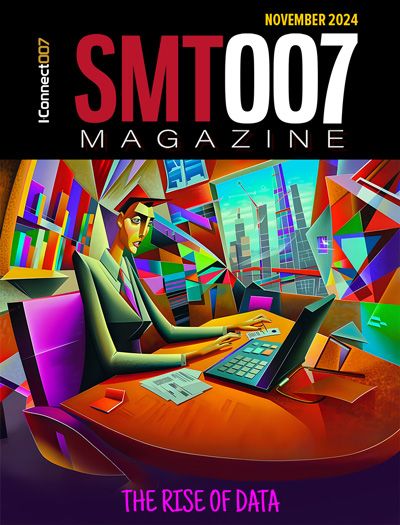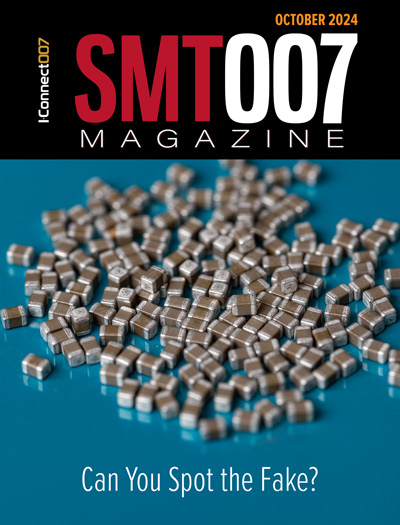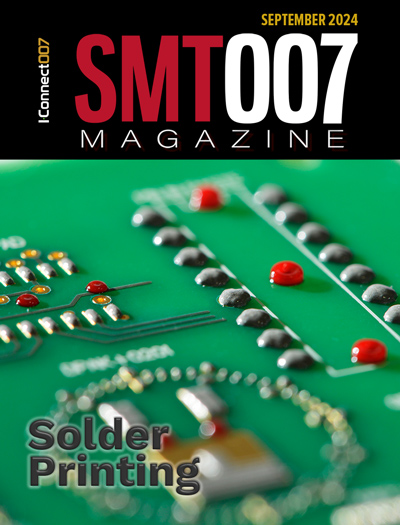-

- News
- Books
Featured Books
- smt007 Magazine
Latest Issues
Current Issue
The Rise of Data
Analytics is a given in this industry, but the threshold is changing. If you think you're too small to invest in analytics, you may need to reconsider. So how do you do analytics better? What are the new tools, and how do you get started?

Counterfeit Concerns
The distribution of counterfeit parts has become much more sophisticated in the past decade, and there's no reason to believe that trend is going to be stopping any time soon. What might crop up in the near future?

Solder Printing
In this issue, we turn a discerning eye to solder paste printing. As apertures shrink, and the requirement for multiple thicknesses of paste on the same board becomes more commonplace, consistently and accurately applying paste becomes ever more challenging.
- Articles
- Columns
Search Console
- Links
- Media kit
||| MENU - smt007 Magazine
Checking In With ICAPE Group
April 3, 2024 | Nolan Johnson, I-Connect007Estimated reading time: 2 minutes
ICAPE Group’s field application engineer Erik Pederson drills down on sustainability, supply chain resiliency, and what value engineering really looks like in this exclusive interview. Founded in 1999, European-based ICAPE Group provides 21 million printed circuit boards and over six million technical parts to manufacturers every month. With 30 PCB manufacturing partners globally and 50 partners providing a wide array of technical parts, ICAPE Group has operations in China, Taiwan, Thailand, South Korea, Vietnam, South Africa, Europe, Mexico, and the United States. The company also focuses on the value proposition for its customers.
Sustainability
Nolan Johnson: How does ICAPE Group incorporate sustainable practices into manufacturing printed circuit boards?
Erik Pederson: There are many things that we do in the process of manufacturing a PCB that focuses on sustainability. PCB fabricators reclaim precious metals from waste and have done so for many years, sending it out to salvage companies that reclaim the metals. Regarding epoxy fiberglass laminate, we can grind it down to small particles that can be used as filler material in things like construction and concrete. As far as the processes themselves, we minimize waste and reclaim materials in as many steps as possible. On the electrolytic copper plating line, when the small copper balls (anodes) are sufficiently depleted, we collect them and send them to salvage for recovery. It is also common to collect router dust from drilling and routing to reclaim especially the gold particles. We reclaim the HASL and precious metals from rinsing during the wet processes. In the etch process, the spent etchant is treated to remove the copper, which is also recovered. This has all been going on for many years, but for someone unfamiliar with the fabrication process, it is important to educate them on all we do to reduce waste.
Johnson: Today, sustainability is not something we only think about during the manufacturing process. PCB fabricators have been focused on environmental sustainability, reducing waste, and maximizing ROI in many ways for decades. Working toward better sustainability really should start long before the board arrives at the PCB shop, correct?
Pederson: That is correct, Nolan. Probably the most important thing we do is to work on sustainability with our customers at the design stage. What are the most (ENIG) and least impactful (OSP) surface treatments to the environment? What is the cost? We also promote the use of halogen-free material. It is my personal belief that customers should pay more attention here. The halogens used to make the fire-retardant materials remain even when you grind down the waste materials. They are harmful to the environment. Today, there are halogen-free materials that have as good a performance as halogen materials, but they cost 20–30% more. But if most PCB makers (and OEMs) would use halogen-free material, the market would drive the price down and they would become more common, addressing a significant environmental issue. One example is NOKIA and Samsung requiring halogen-free material for their PCBs.
To read this entire conversation, which appeared in the March 2024 issue of PCB007 Magazine, click here.
Suggested Items
Designing for Cost to Manufacture
11/21/2024 | Marcy LaRont, I-Connect007ICAPE's Richard Koensgen, a seasoned field application engineer with a rich background in PCB technology, shares his journey of working with customers and manufacturers through the intricacies of circuit board development and emphasizes the importance of early-stage collaboration with PCB designers. With a focus on tackling the most challenging aspects of PCB design and manufacturing, he discusses everything from layout considerations to the thermal challenges of today's technology when it comes to designing for cost.
PCB Design Software Market Expected to Hit $9.2B by 2031
11/21/2024 | openPRThis report provides an overview of the PCB design software market, detailing key market drivers, challenges, technological advancements, regional dynamics, and future trends. With a projected compound annual growth rate (CAGR) of 13.4% from 2024 to 2031, the market is expected to grow from USD 3.9 billion in 2024 to USD 9.2 billion by 2031.
Global Citizenship: What I’ve Learned About the American PCB Business
11/20/2024 | Tom Yang -- Column: Global CitizenshipNavigating the complexities of the American PCB business has been an eye-opening experience. During my time in America, I have become more familiar with the American PCB business and doing business here. If I may, and with your indulgence, I would like to share my humble impressions of the American PCB industry and the American way of doing business, which I find interesting and admirable.
AI Servers and EVs Drive China's PCB to $26.79B in 2024
11/19/2024 | TPCAThe Taiwan Printed Circuit Association (TPCA) and the Industrial Technology Research Institute (ITRI) recently released the 2024 China PCB Industry Dynamics Report.
PCB Carolina’s Formula: Industry Experts and Catered Food
11/18/2024 | Andy Shaughnessy, Design007 MagazinePCB Carolina organizers at the Better Boards design bureau seem to have found the perfect formula: Industry experts plus catered food equals a constantly expanding show. This one-day tabletop show has been growing for two decades, and that trendline continued with this year’s event on November 13.


